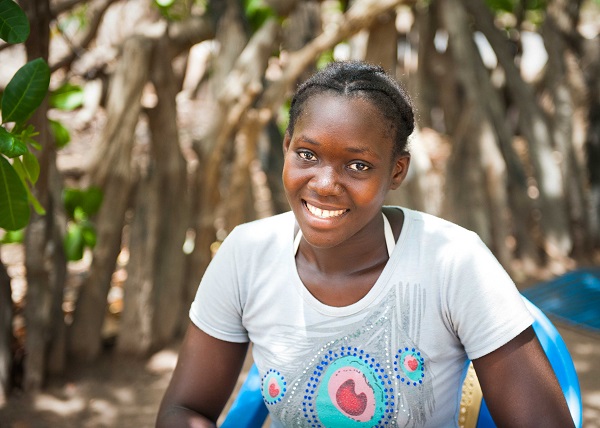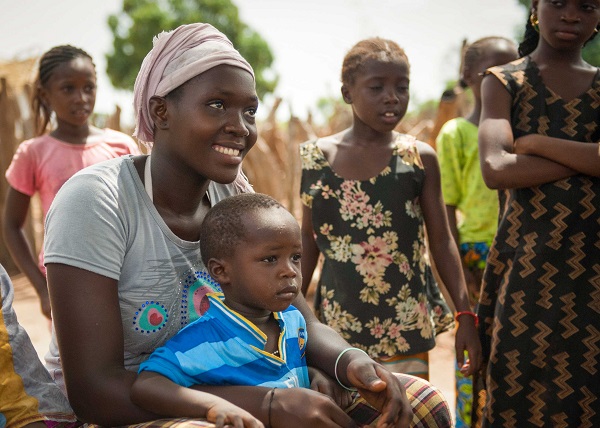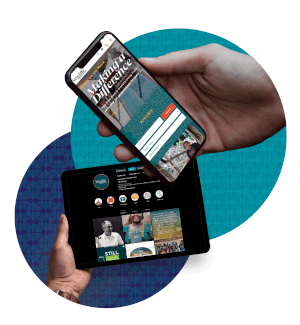Famata’s Story
Taking hold of literacy with both hands
In a small village in southern Senegal, a young woman sits in the shade of a large tree with her son in her lap, watching a man read a small paperback book. It’s printed in their language, Manjak. A smile comes across the man’s face as he slowly sounds out the words in his language for the first time.
The woman, named Famata, listens quietly. She learned to read Manjak for the first time not too long ago, and it has changed her life.

In Senegal, school is taught in the official national language of French. But most people in Senegal don’t speak French as their first language. So kids are being asked to come to school and learn in a language that they do not speak at home. And they’re being taught by teachers who in many cases haven’t mastered the French language themselves.
Understandably, Famata struggled with education from the start — so much so that it took a serious toll on her self-esteem from a young age. Before long she felt like she was hopeless, that school was pointless, and she’d rather give up.
“I had difficulty reading and writing, and I told my mom I was going to leave school,” she said.
Then, at 14 years old, Famata became pregnant. With her spirits already low, money running lower and a baby on the way, she dropped out of school.
Unfortunately her story is not uncommon in Senegal and other developing countries, where girls typically aren’t expected to excel in school. They’re taught that their place is in the home, not the classroom. And since schooling is costly and money is always tight, most families believe it’s more worthwhile to invest in educating their brothers and male peers.
Famata didn’t have high hopes for her future. But that started to change when Wycliffe began funding a Manjak literacy program in her village. Through the program, all the men and women in the community were invited to learn to read and write in their own language.
Suddenly Famata had the opportunity to try class again — this time for free and in the language she knows and loves. She thrived in Manjak literacy, impressing her teacher and her peers alike.
“She spent all her time reading,” said her Manjak teacher, Abdoulaye Ndiaye. “She didn’t find it difficult [to learn Manjak] because she loved what she was doing.”

Often when Famata read out loud in class, her peers thought she was a teacher because her skill level was so much higher. Though she once walked away from her own education, in the Manjak class she helped other students succeed at reading so they wouldn’t make the same choice.
“She encouraged people in class…who were sometimes absent,” Abdoulaye said. “She said ‘Don’t be discouraged!’ She was a great support.”
The changes in Famata’s outlook and self-confidence are evident to everyone, including Famata.
“They [the instructors] have given me knowledge [and skills] by teaching me to read and write in Manjak,” she said. “I am taking hold of that with both hands.”
She had the courage to return to French school where she’s ranked near the top of her class, thanks to the confidence and skills she gained in the Manjak literacy class.
Soon Famata will be writing text for the literacy project. She aspires to be a teacher, and she’s going to start by teaching her own son.
“Since I know how to write Manjak, I’ll teach my child to read and write Manjak,” Famata said. “Pray for my child, that he would have good health and that he would be able to enjoy the richness of his language.”
Today, as she sits under the shade of a tree with her son watching a man read his language for the first time, she can see firsthand how Manjak literacy is growing. And she can know that one day she’ll be helping others in her community gain the ability to read in Manjak too.
Sign Up for Weekly “God Sightings” Text Messages
Each week, you can receive an update on what God is doing around the world — directly to your phone! Stay informed, inspired and encouraged by the latest news, and join us in praying for God’s name to be made known among the nations through the work of Bible translation.
Text SIGHTINGS to 407-358-0916 to get started.





